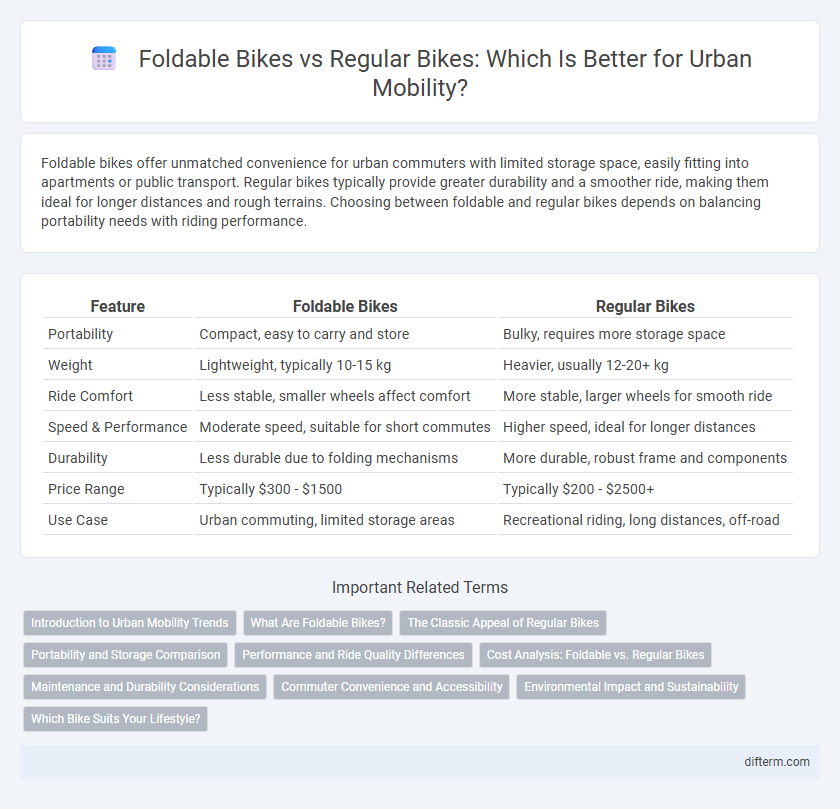Foldable bikes offer unmatched convenience for urban commuters with limited storage space, easily fitting into apartments or public transport. Regular bikes typically provide greater durability and a smoother ride, making them ideal for longer distances and rough terrains. Choosing between foldable and regular bikes depends on balancing portability needs with riding performance.
Table of Comparison
| Feature | Foldable Bikes | Regular Bikes |
|---|---|---|
| Portability | Compact, easy to carry and store | Bulky, requires more storage space |
| Weight | Lightweight, typically 10-15 kg | Heavier, usually 12-20+ kg |
| Ride Comfort | Less stable, smaller wheels affect comfort | More stable, larger wheels for smooth ride |
| Speed & Performance | Moderate speed, suitable for short commutes | Higher speed, ideal for longer distances |
| Durability | Less durable due to folding mechanisms | More durable, robust frame and components |
| Price Range | Typically $300 - $1500 | Typically $200 - $2500+ |
| Use Case | Urban commuting, limited storage areas | Recreational riding, long distances, off-road |
Introduction to Urban Mobility Trends
Urban mobility trends reveal a growing demand for foldable bikes due to their compact design and ease of storage in tight city spaces. Foldable bikes offer enhanced convenience for multimodal commuters, allowing seamless integration with public transportation systems. Regular bikes maintain popularity for longer rides and durability, but foldable models drive innovation in urban transport solutions.
What Are Foldable Bikes?
Foldable bikes are compact, portable bicycles designed with hinges or joints that allow them to be easily folded for storage and transport. They offer significant space-saving advantages compared to regular bikes, making them ideal for urban commuters and travelers who need to combine cycling with public transportation. These bikes typically feature lightweight frames and smaller wheels, enhancing their portability without sacrificing ride quality.
The Classic Appeal of Regular Bikes
Regular bikes maintain their classic appeal through simplicity, durability, and a timeless design that has been refined over decades. Their reliable performance, lower maintenance needs, and ergonomic frames make them ideal for long-distance commuting and recreational cycling. Unlike foldable bikes, regular bikes offer enhanced stability and comfort, which attract traditional cyclists and enthusiasts seeking a more robust riding experience.
Portability and Storage Comparison
Foldable bikes offer superior portability by reducing to a compact size, making them ideal for easy storage in small apartments or car trunks compared to regular bikes. Their lightweight frames and quick-fold mechanisms facilitate convenient transport on public transit or in crowded urban spaces. Regular bikes, while typically more durable and stable, require more storage space and are less practical for commuters with limited storage options.
Performance and Ride Quality Differences
Foldable bikes typically feature smaller wheels and lightweight frames, resulting in slightly reduced speed and stability compared to regular bikes with larger wheels and more rigid constructions. Ride quality on foldable bikes often feels less smooth due to compact frame geometry and suspension limitations, while regular bikes provide better shock absorption and comfort over longer distances. Performance-wise, regular bikes excel in efficiency and endurance, making them ideal for commuting and extended rides, whereas foldable bikes prioritize portability and urban convenience.
Cost Analysis: Foldable vs. Regular Bikes
Foldable bikes typically have a higher upfront cost compared to regular bikes due to specialized hinges, lightweight materials, and compact design engineering. Maintenance expenses for foldable bikes may also be elevated, as unique components can require specialized repairs or replacement parts. However, regular bikes generally offer more affordable maintenance and initial purchase prices, making them a cost-effective option for daily commuting and recreational use.
Maintenance and Durability Considerations
Foldable bikes require more frequent maintenance due to their complex hinge mechanisms and moving parts, which can wear out faster than those on regular bikes. Regular bikes typically offer greater durability with sturdier frames and fewer points of mechanical stress, making them ideal for long-term use in varied conditions. Choosing between foldable and regular bikes depends on balancing convenience with maintenance demands and expected durability.
Commuter Convenience and Accessibility
Foldable bikes offer superior commuter convenience by allowing easy storage in compact spaces such as offices, public transport, and crowded urban apartments, enhancing accessibility for daily travel. Their lightweight frames and quick folding mechanisms reduce the hassle of parking and theft concerns compared to regular bikes. Regular bikes, while generally more robust and stable for longer rides, face challenges in urban accessibility due to limited storage options and bulkier design.
Environmental Impact and Sustainability
Foldable bikes significantly reduce environmental impact by requiring fewer raw materials and enabling compact storage, which promotes urban mobility and decreases reliance on motor vehicles, thereby lowering carbon emissions. Their lightweight and portable design encourages multi-modal transportation, integrating seamlessly with public transit and reducing the overall carbon footprint. Regular bikes, while sustainable, often demand more manufacturing resources and space for storage, making foldable bikes a more eco-efficient choice for urban commuters seeking sustainable mobility solutions.
Which Bike Suits Your Lifestyle?
Foldable bikes offer compact portability and convenience for urban commuters with limited storage, making them ideal for short trips and multimodal travel. Regular bikes provide greater durability, speed, and comfort for longer distances and outdoor enthusiasts focused on performance and stability. Choosing between foldable and regular bikes depends on your daily travel patterns, storage space, and the balance between convenience and ride quality.
foldable bikes vs regular bikes Infographic

 difterm.com
difterm.com